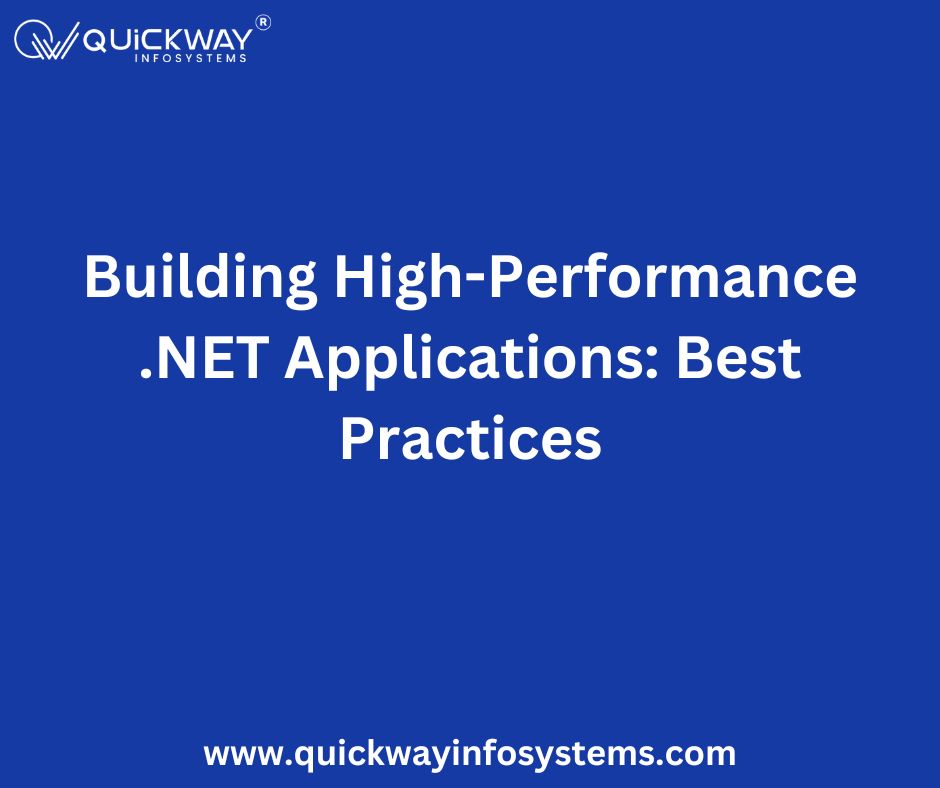Building High-Performance .NET Applications: Best Practices
 Quickway Infosystems
Quickway Infosystems
.NET, a powerful platform for building scalable and high-performance applications, offers various techniques to optimize your code and improve application responsiveness. This comprehensive guide will explore essential performance best practices that every .NET developer should know.
Profiling and Benchmarking
Identify Bottlenecks: Use profiling tools like dotTrace, PerfView, or Visual Studio's built-in profiler to identify performance bottlenecks in your code.
Measure Performance: Benchmark different code implementations to compare their performance and identify areas for optimization.
Asynchronous Programming
Non-Blocking Operations: Utilize asynchronous programming patterns like async/await to avoid blocking the main thread and improve application responsiveness.
Task Parallel Library (TPL): Leverage the TPL to execute tasks in parallel and use multi-core processors.
Memory Management
Garbage Collection: Understand the garbage collection process and optimize your code to minimize memory allocations and reduce garbage collection overhead.
Object Pooling: Use object pooling to reuse objects instead of creating new ones, reducing memory pressure.
Caching
In-Memory Caching: Store frequently accessed data in memory to reduce database queries and improve performance.
Output Caching: Cache the rendered output of pages or components to avoid unnecessary processing.
Distributed Caching: Explore distributed caching solutions like Redis or Memcached for large-scale applications.
Database Optimization
Query Optimization: Write efficient SQL queries and use indexes appropriately to improve database performance.
Connection Pooling: Use connection pooling to reuse database connections, reducing the overhead of establishing new connections.
Database Design: Optimize your database schema for performance, considering factors like normalization and indexing.
Asynchronous I/O
- Avoid Blocking Operations: Use asynchronous I/O operations for tasks like file access, network communication, and database interactions to prevent blocking the main thread.
Code Optimization
Profiling: Identify performance-critical sections of your code and optimize them.
Algorithm Selection: Choose efficient algorithms and data structures for your tasks.
Avoid Unnecessary Calculations: Minimize redundant calculations and optimize expressions.
Dependency Injection
Loose Coupling: Use dependency injection to decouple components and improve maintainability.
Lifetime Management: Manage the lifetime of dependencies effectively to avoid resource leaks.
Third-Party Libraries
Choose Carefully: Evaluate third-party libraries for performance and compatibility before using them in your projects.
Consider Alternatives: If a library is known to have performance issues, explore alternative options.
Continuous Profiling
- Monitor Performance: Implement continuous profiling to monitor application performance in production environments and identify potential issues.
Cloud Optimization
Leverage Cloud Services: Utilize cloud-native services like serverless functions and managed databases to optimize performance and scalability.
Serverless Architecture: Consider serverless functions for event-driven workloads to reduce infrastructure costs and improve scalability.
By following these best practices and continuously optimizing your .NET applications, you can significantly improve performance, enhance user experience, and ensure the success of your projects.
Looking for a high-performance ASP.NET application development company?
Consider partnering with an experienced ASP.NET development services provider. An ASP.net core development company India can offer a cost-effective solution with a skilled developer pool. They can help you build and optimize your ASP.NET applications for maximum performance and scalability.
Conclusion
Building high-performance .NET applications requires a combination of technical expertise, best practices, and continuous optimization. By following the techniques outlined in this guide, you can significantly improve the speed, responsiveness, and scalability of your .NET applications.
Remember to prioritize performance testing, profiling, and optimization throughout the development lifecycle. Stay updated with the latest .NET advancements and emerging technologies to ensure your applications remain at the forefront of performance and efficiency.
Subscribe to my newsletter
Read articles from Quickway Infosystems directly inside your inbox. Subscribe to the newsletter, and don't miss out.
Written by

Quickway Infosystems
Quickway Infosystems
Crafting Innovative Tech Solutions for a Connected World! at Quickway Infosystems, we build robust enterprise-level Web & Mobile Apps! We specialize in delivering high-quality custom software development services that help businesses streamline their operations, improve their efficiency, and drive growth. We are an experienced Software Outsourcing Company with developers who are passionate about creating software that solves real-world problems and delivers measurable results. To Visit Our Websites:-https://quickwayinfosystems.com/